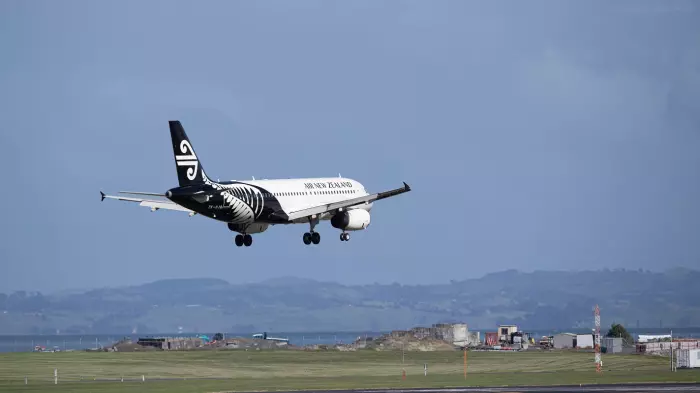VECTOR ANNOUNCES SOLID HALF YEAR RESULTS
HALFYR
Tue, Feb 21 2023 08:30 am
• Group net profit after tax of $100.3 million
• Adjusted EBITDA1 of $274.0 million(2), up 3.9%
• Total capital expenditure $316.8 million, up 17.2%
• Interim dividend 8.25 cents per share(3)
• Vector and Queensland Investment Corporation to finalise arrangements for metering joint venture.
• Key SAIDI and SAIFI network reliability measures tracking to target, prior to any impacts from January flooding or Cyclone Gabrielle(4)
Vector Group (NZX: VCT) today announces its result for the first half of the 2023 financial year(5).
Vector Chair Jonathan Mason said "firstly we want to acknowledge the impact on our customers from the extreme weather events in the last month with the floods followed by Cyclone Gabrielle compounding to leave devastation across the city, and across the North Island. Our network has experienced significant damage with restorations complicated by the extent and complexity of the damage, road access and on-going slips. Our teams have worked tirelessly and will continue to do so until all of our customers have their power back.
“Regarding Vector’s 2023 first half results, Vector has delivered a solid result, within a challenging environment. While adjusted EBITDA of $274 million reflected 3.9% growth in EBITDA over first half 2021, NPAT was down $15.2 million, or 13.2% on the prior year to $100.3 million. This was largely due to the prior period’s $7.1 million gain on sale of the 50% share of Treescape, higher depreciation, and interest costs and a $14 million negative fair value non cash movement on financial instruments. This was partially offset by higher earnings and capital contributions.
“As a consequence of the conditional agreement with Queensland Investment Corporation for the sale of our metering business, metering operations have been classified in these results as held for sale and as discontinued operations.
“We continue to see impacts flowing through from high inflation, which impacts our costs. In our nonregulated businesses we can pass on some of these higher costs to customers. Within our regulated businesses, regulatory mechanisms enable higher than expected inflation to be recovered via higher prices, although this is deferred by two years under the current regulatory model.
“The Group’s adjusted earnings before interest, tax depreciation and amortisation of $274.0 million includes $179.4 million from continued operations, and $94.6m from discontinued operations, which are the metering operations.
“Total capital expenditure in the first six months was $316.8 million, an increase of $46.4 million or 17.2% on the prior period. This includes $91.7 million in relation to the metering operations. The increase reflects continued investment in infrastructure to support Auckland’s growth, improve network resilience and rollout of 4G modem upgrades across the New Zealand advanced meter base and the expansion of our metering base in Australia.
“The Board has determined that shareholders will receive an interim dividend of 8.25 cents per share imputed at 10.5%(6).
“Regarding the agreement reached with QIC, completion of the deal is expected in the Q2 2023, assuming regulatory approval and confirmation of financing. While the deal is still conditional, we’re excited about the opportunities for the Vector group which will come from its investment in the new metering joint venture. The board will consider the details of how the proceeds of the sale will be used, however we are committed to reducing overall debt.”
Group Chief Executive Simon Mackenzie said, “We’re very pleased to have selected QIC as our preferred partner to accelerate growth opportunities for Vector Metering, enabling the business to continue to play a key role in the transition of the energy industry. QIC is a strong long-term partner for Vector Metering, given QIC’s scale, experience and breadth of relationships in the New Zealand and Australian energy markets, its access to capital and its shared commitment to growth and customer outcomes.
“We’ve also seen several milestones reached in our work with Auckland Transport to provide for the electrification of the region’s bus fleet, including the provision of smart charging capabilities that will have a significant impact in reducing the cost of electrification.
“With climate change, emissions reductions goals, and now the rising cost of living, it’s even more critical that the sector, and our regulators, understand the criticality of our energy infrastructure and the challenges ahead of us to manage both the growth of energy and the rapid electrification of transport and industry, in an affordable way.
“In addition, the extreme weather we’ve seen already this year with the latest devastating Cyclone Gabrielle, makes it clear that funding for climate resilience needs urgent attention in the upcoming resetting of regulatory expenditures. Expenditure settings must support more climate resilience, and the critical transition of the whole industry, of which distribution businesses are essential. Current regulation does not facilitate the type of innovation or level of investment required to boost resilience and achieve an affordable decarbonisation. If we want to enable the change that’s needed, we need to act now. It’s been estimated that New Zealand will need to spend $22 billion in distribution infrastructure alone to manage both the impacts of climate change and the growth in demand for electricity, including the rapid electrification of transport and industry. Given that scale of investment, distribution businesses must have sufficient cashflows to support that level of investment, and appropriate commercial returns for investors.
“The need to fund such levels of investment has previously been recognized by the Commerce Commission in changing Transpower’s regulatory settings to better align cashflows with high levels of investment. Distributors also need better aligned cashflows and a key decision facing the Commerce Commission will be to allow for Regulated Asset Bases to not be linked to inflation.”
Business segment performance
Electricity and gas networks
Regulated adjusted EBITDA for the six months to 31 December 2022 was up $11.5 million (6.2%) to $197.0 million against the prior six-month period. The increase in adjusted EBITDA was largely driven by higher electricity and gas revenue with the increase in electricity revenue due to an increase in net connections and higher other pass-through and recoverable costs. Gas revenue has increased due to higher prices and higher volumes.
Revenue increased 9.8% to $464.1 million, driven by the higher recovery of pass-through and recoverable costs and an increase in capital contributions, up 34.2% to $96.5 million reflecting continued connection growth and the introduction of a development contribution.
New electricity connections increased to 7,873 from 6,603 in the prior year. We also added 1,330 new gas connections from 1,731 a year earlier. Total electricity connections stood at 606,802, up 1.7% from 596,396 a year earlier. While total gas connections were 118,774, up 1.0% from 117,628 a year ago.
Volumes transported across the electricity network increased 1.4% to 4,374 GWh from 4,313 GWh a year earlier, with increasing business volumes partially offset by lower residential volumes. Auckland gas distribution volumes were up 2.9% at 7.2 PJ from 7.0 PJ a year earlier.
In the first half of FY23, gross regulated capex increased by 20.3% to $197.4 million compared to $164.1 million a year earlier. Capex net of capital contributions was 9.4% higher than the prior year at $100.9 million. Capex continues to be at historically high levels due to investment to improve the reliability and resilience of our network as well as higher growth capex reflecting the continued growth in connections and infrastructure projects.
Gas Trading
Adjusted EBITDA for the gas trading business was up 0.4% at $12.7 million from $12.2 million a year earlier. The result was mainly due to the impact of higher cost of LPG product and higher transportation costs which has only been partially recovered through higher customer prices. The higher cost is the result of higher Saudi Aramco price of LPG, higher ETS prices and a weaker New Zealand dollar all contributing to a higher cost of gas. This has been partially offset by improved performance from the natural gas and Liquigas business.
Bottle Swap 9kg volumes are down 13.0% to 309,855 bottles from 356,098 a year earlier with most of the decrease due to the loss of a major customer. LPG bulk and cylinder sales were also lower, down 10.7% at 22,535 tonnes. Liquigas LPG tolling volumes were up 4.4% to 56,908 tonnes from 54,489 tonnes a year earlier. Natural gas sales volumes were down 0.1 PJ to 2.8 PJ from 2.9 PJ in the prior period.
Metering
Adjusted EBITDA for the Metering business was $94.6 million, up $8.6 million or 10.0% from a year earlier with gains coming from the continued rollout of advanced meters, particularly in Australia.
Metering revenue increased 10.1% to $128.3 million from $116.5 million a year earlier driven by the increased deployment of advanced meters.
In the six months to 31 December 2022 we have installed 12,416 additional advanced electricity meters in New Zealand and 38,016 additional advanced meters in Australia. Our advanced meter base grew 5.2% to 2.03 million from 1.93 million the year before. We have now deployed over 528,000 advanced meters in Australia. We successfully migrated our Australian metering fleet to the 5 minute market, in line with regulatory timeframes and requirements.
In the first half, metering capex invested increased by 13.3% to $91.7 million reflecting the continued deployment of new advanced meters in Australia, 4G modem replacement program and roll out of advanced gas meters.
Corporate and other
HRV has had a challenging start to the year and has been impacted by resourcing challenges in what is a tight labour market.
The Vector Powersmart performance can be subject to the timing of contract delivery and the year to date result reflects lower revenue as a result of this timing. The pipeline for this business remains strong.
Vector Fibre has had a solid start to the year evidenced by year on year revenue and earnings growth.
Corporate cost is higher than the prior year due mainly to higher computer costs driven by an increase in digital projects that are expensed rather than capitalised such as cloud implementation activity and higher CPI increases.
Investment in Vector Technology Solutions is also driving additional costs as they continue to develop cyber and other solutions for local and global markets.
FY23 Guidance
Auckland growth is expected to continue, with continued growth in new electricity connections and infrastructure activity remaining elevated. Full year guidance for adjusted EBITDA is between $515m-$525m, based on BAU results, excluding the change in treatment that would follow finalisation of the metering deal, and including an estimate of the costs for recent flooding and cyclone activity.
Notes
1 EBITDA and Adjusted EBITDA are non-GAAP measures which the directors and management believe provide useful
information as they are used internally to evaluate performance of business units, to establish operational goals and to allocate
resources. See the interim financial statements for further details or click on this link to see Vector’s policy
2 This includes adjusted EBITDA from continuing operations of $179.4 million and discontinued operations (metering) of $94.6 million
3 The dividend is partially imputed at 10.5% and will be paid to shareholders who are on the register at 28 March 2023, with payment made on 6 April 2023.
4 SAIDI and SAIFI results for the regulatory period 1 April to 31 December 2022, which does not include any impact from the Auckland flood event in January 2023 or Cyclone Gabrielle in February 2023.
5 In December 2022, Vector announced an agreement with Queensland Investment Corporation (QIC) for the sale of 50% of its metering operations. As a result of this announcement, the metering operations have been classified in these results as held for sale.
6 Further information on imputation credits is available on our website under Industry Updates.
ENDS
Vector’s interim financial statements are available here: vector.co.nz/reports
Investor contact
Jason Hollingworth, Chief Financial Officer, Vector
[email protected], 021 312 928
Media contact
Matthew Britton, Senior Communications Partner, Vector
[email protected], 021 224 2966
About Vector
Vector is an innovative New Zealand energy company which runs a portfolio of businesses delivering energy and communication services to more than one million homes and commercial customers across Australasia and the Pacific. Vector is leading the country in creating a new energy future through its Symphony strategy which puts customers at the heart of the energy system. Vector is listed on the New Zealand Stock Exchange with ticker symbol VCT. Our majority shareholder, with voting rights of 75.1%, is Entrust. For further information, visit www.vector.co.nz




